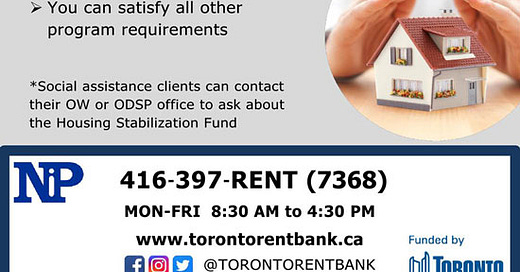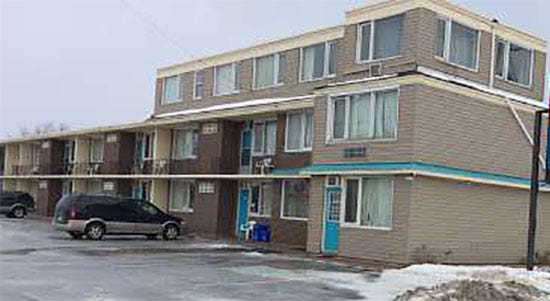Toronto’s Rent bank program
Rent bank
Rent bank loans are intended to help renters experiencing a temporary and unplanned financial crisis with their expenses directly linked to staying housed. To provide support to a wider population in emergency situations, opportunities should be explored to establish a Rent Bank program for low–to mid–income earners as a repayable loan to support housing loss prevention for a short-time period.
—page 37 Greater Sudbury’s Roadmap to Ending Homelessness May 2024
Recommendation:
Rent Bank
Description:
Explore opportunities to establish a Rent Bank for low-to-mid- income earners as a repayable loan to support housing loss prevention for a short-time period.
Estimated Cost:
$100,000 a year.
Key Performance Indicators
Number of individuals accessing the rent bank program.
Appendix A, page 5
A rent bank is a predominantly Canadian service that provides interest-free loans to low-income households who have regular income but face eviction as a result of a short-term financial crisis. Rent banks are a homelessness prevention strategy.
The Toronto Rent Bank Pilot Grant Program gives eligible applicants grants. The above description states that Sudbury is looking to provide interest-free loans.
Toronto’s Rent Bank
Effective March 1, 2024, the maximum Toronto Rent Bank grant for rental arrears is up to $5,000 or up to four (4) months of arrears, whichever is the lower amount.
If you received a loan from the Rent Bank in 2020 or earlier, then you are required to pay it back. Please contact the Rent Bank directly to discuss your loan status and repayment.
It seems that the Toronto Land bank provided loans but now offers grants.
Legal Clinic—Eviction prevention
Increase collaboration with the Community Legal Clinic to support information
exchange and eviction prevention within community housing and private market rental accommodations. Evidence demonstrates that establishing partnerships for tenant supports and mediation is effective in homelessness prevention.
—page 37 Greater Sudbury’s Roadmap to Ending Homelessness May 2024
Recommendation:
Legal Clinic—Eviction Prevention
Description:
Increase collaboration with the Community Legal Clinic to support information exchange and eviction prevention within community housing and private market rental accommodations.
Estimated Cost:
Subject to agreements and budget with Community Legal Clinic.
Key Performance Indicators
Number of tenancies saved through partnership with Community Legal Clinic.
Appendix A, page 5
The city is suggesting that they should work with the Community Legal Clinic to prevent community housing evictions. Greater Sudbury Housing Corporation’s position is that "Evictions should be a last resort."
Won’t this proposed Legal Clinic—Eviction Prevention program cause issues between two different city departments?
In some cases, private landlords may be evicting tenants in violation of Ontario's Residential Tenancies Act. In those situations, such as bad-faith renovictions, involving the Community Legal Clinic to assist the tenants would be appropriate.
There are times when private market landlords are evicting bad tenants. In these cases, it is more difficult to justify assisting those who fail to pay their rent, damage the landlord’s property or commit criminal acts in their units.
Land banking—Phase 2
Implement Phase Two of the Land Banking Strategy which was adopted by City Council in 2020. Phase Two will involve site preparation, including rezoning where required and de-risking sites that have been identified as suitable for the development of affordable housing in conjunction with the Affordable Housing Community Improvement Plan. These infill projects will maximize the use of existing infrastructure and contribute to vibrancy in existing neighbourhoods, while increasing the financial viability of affordable housing projects.
—page 35-36 Greater Sudbury’s Roadmap to Ending Homelessness May 2024
Recommendation:
Land Banking Phase Two
Description:
Planning Services—Phase Two will involve site preparation, including rezoning where required and de-risking sites that have been identified as suitable for the development of affordable housing in conjunction with the Affordable Housing Community Improvement Plan.
Estimated Cost:
Business case for 2025 regarding shovel readiness of sites.
Key Performance Indicators
Not Available.
Appendix A, page 4
Land banking for transistional housing, full-support housing and rent-geared-to-Income housing can help eliminate homelessness.
Land banking for affordable housing (roughly 80% of market rent) is like most trickle-down economic policies. The benefits to those on the bottom are slight or non-existent.
Bridge Housing
Greater Sudbury uses local motel rooms to bridge individuals between homelessness and permanent housing. The bridge program is intended to relieve capacity within the emergency shelter system and stabilize persons who are homeless and had an imminent offer of permanent housing.
Between January 1, 2022 and December 1, 2022, there have been 63 people supported through bridge housing.
Develop a Formalized Rapid Re-Housing Program
“It is often observed that when people first present to shelter they are doing well, but as time passes and housing is not available, they start to decline... we often see the same people back again after they are housed due to being evicted due to lack of life skills these individuals are lacking such as how to handle their finances or how to properly take care of their apartment with proper cleanliness.”
—Shelter Staff (Homelessness Consultation 2021)
A more formalized Rapid Re-Housing program should be implemented to connect with individuals as soon as they enter the homelessness system and provide them with rapid re-housing supports. This type of program reduces the likelihood of the individual continuing to be homeless for six months or more and entering chronic homelessness, which often increases their complexity of needs.
A dedicated rapid re-housing team in Greater Sudbury does not currently exist, however some of these supports are provided by City of Greater Sudbury Client Navigators.
Through this recommendation, the existing use of bridge housing as part of the rapid re–housing response should be examined.
—page 43 Greater Sudbury’s Roadmap to Ending Homelessness May 2024
Recommendation:
Develop a Formalized Rapid Re- Housing Program
Description:
A formalized Rapid Re-Housing Program should be implemented to connect with individuals as soon as they enter the homelessness system and provide them with rapid re–housing supports.
Examine the existing use of bridge housing as part of a rapid re–housing response.
Estimated Cost:
Not Available—completed through existing staffing complement.
Option to review as part of the existing bridge housing program.
Key Performance Indicators
Number of individuals supported to become housed through rapid re-housing efforts.
Appendix A, page 4
There should be an estimated cost for a Bridge Housing program, don’t you think?
It shouldn’t be too hard. Ask the local motels if they are interested in partaking in the program and what would be the daily and weekly rates that they would charge for a room. Then add the cost of meals.













